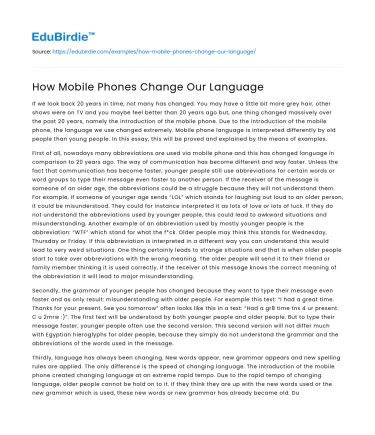If we look back 20 years in time, not many has changed. You may have a little bit more grey hair, other shows were on TV and you maybe feel better than 20 years ago but, one thing changed massively over the past 20 years, namely the introduction of the mobile phone. Due to the introduction of the mobile phone, the language we use changed extremely. Mobile phone language is interpreted differently by old people than young people. In this essay, this will be proved and explained by the means of examples.
First of all, nowadays many abbreviations are used via mobile phone and this has changed language in comparison to 20 years ago. The way of communication has become different and way faster. Unless the fact that communication has become faster, younger people still use abbreviations for certain words or word groups to type their message even faster to another person. If the receiver of the message is someone of an older age, the abbreviations could be a struggle because they will not understand them. For example, if someone of younger age sends “LOL” which stands for laughing out loud to an older person, it could be misunderstood. They could for instance interpreted it as lots of love or lots of luck. If they do not understand the abbreviations used by younger people, this could lead to awkward situations and misunderstanding. Another example of an abbreviation used by mostly younger people is the abbreviation: “WTF” which stand for what the f*ck. Older people may think this stands for Wednesday, Thursday or Friday. If this abbreviation is interpreted in a different way you can understand this would lead to very weird situations. One thing certainly leads to strange situations and that is when older people start to take over abbreviations with the wrong meaning. The older people will send it to their friend or family member thinking it is used correctly. If the receiver of this message knows the correct meaning of the abbreviation it will lead to major misunderstanding.
Save your time!
We can take care of your essay
- Proper editing and formatting
- Free revision, title page, and bibliography
- Flexible prices and money-back guarantee
Secondly, the grammar of younger people has changed because they want to type their message even faster and as only result: misunderstanding with older people. For example this text: “I had a great time. Thanks for your present. See you tomorrow” often looks like this in a text: “Had a gr8 time tnx 4 ur present. C u 2mrw :)”. The first text will be understood by both younger people and older people. But to type their message faster, younger people often use the second version. This second version will not differ much with Egyptian hieroglyphs for older people, because they simply do not understand the grammar and the abbreviations of the words used in the message.
Thirdly, language has always been changing. New words appear, new grammar appears and new spelling rules are applied. The only difference is the speed of changing language. The introduction of the mobile phone created changing language at an extreme rapid tempo. Due to the rapid tempo of changing language, older people cannot be hold on to it. If they think they are up with the new words used or the new grammar which is used, these new words or new grammar has already became old. Due to the constant change in mobile phone language used by younger people older people cannot keep up with it and this will also lead to misunderstanding between the two generations.
At last, the use of emoticons can also lead to miscommunication. Emoticons could replace certain words. Older people will not understand the emoticons because they take them too literally. Some old people will not even understand that emoticons could replace words so they will not understand. For example, if we look at this familiar text: “I had a great time. Thanks for your present. See you tomorrow.” It could look like this on a mobile phone from a younger person: “I had a time. for your . See you tomorrow.” Again, if a person of older age will read this message they could interpreted it as: “I had a time. For your. See you tomorrow. This text would be considered ridiculous because it is not a normal and correct sentence. It could also be read as: “I had a thumb time. Pray for your presents. See you tomorrow.”This sentence is also a curious sentence. Both interpretations of older people of the text messages will lead to miscommunication between younger and older people.
In conclusion, the introduction of the mobile phone has changed language. Due to the use of abbreviations, different grammar and emoticons in the text messages of younger people and the speed of changing language, older people cannot keep up with the mobile phone language. This simply leads to misunderstanding in communication via mobile phones between younger people and older people.






 Stuck on your essay?
Stuck on your essay?

